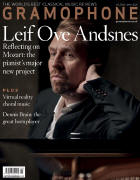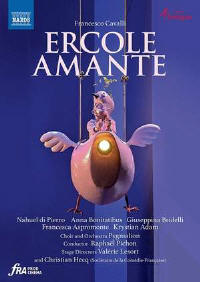Texte paru dans: / Appeared in: |
|
|
Outil de traduction (Très approximatif) |
|
|
Reviewer:
David Vickers Cardinal Mazarin planned lavish festivities for Louis XIV’s marriage to his double first cousin Maria Theresa of Spain, so the Sun King’s chief minister commissioned Ercole amante from Cavalli (the cardinal had also commissioned Rossi’s Orfeo in 1647. However, it took over two years for the theatre and spectacular sets to be designed and built in the Palais Tuileries, so the production took place belatedly in February 1662, 20 months after the wedding, by which time the new queen had already given birth to the Dauphin. Ballets by Isaac de Benserade and Lully meant that the entertainment stretched out to six hours, but bad acoustics caused the music to be almost inaudible. The only recording of Cavalli’s ill-fated opera, conducted by Michael Corboz, is 40 years old (Erato, 10/80 – nla). Just over a decade ago, there was a DVD of David Alden’s Netherlands Opera production, conducted by Ivor Bolton. In November 2019 this imaginatively playful staging by Valérie Lesort and Christian Hecq was filmed at Paris’s Opéra-Comique. It’s witty and eye-catching, with all sorts of surprising theatrical tricks (lots of flying machinery and judicious usage of a trap door), and the co-directors relish the fun that the drama offers but also appear equally interested in touching pathos and telling insights when it counts. Nahuel di Pierro’s Hercules veers between charismatic strongman and selfish bully. Giuseppina Bridelli achieves a potent balance of emotional power and vocal finesse in Deianira’s increasingly desperate laments. Francesca Aspromonte is captivating as the tormented Iole, who resists Hercules’ unwanted advances, grieves for the father that he murdered and adores the anti-hero’s softer-natured son. Krystian Adam’s sweet-toned Hyllus is a pensive antithesis of his volatile father; his emotional soliloquy as he leaps suicidally from imprisonment in a tower into a malevolent ocean is cleverly staged using sliding wooden waves that make a knowing nod to Baroque-style scenic effects. His rescue by Luca Tittoto’s green-bearded Neptune in a two-man submarine exemplifies the good-natured humour of this production. Giulia Semenzato’s eloquent Venus makes comparably entertaining interventions, emerging from flowers in Botticellian fashion or operating a pink flying bird. Anna Bonitatibus’s imperious Juno flies in a hot-air balloon or rides a peacock (attached to her costume). Her visit to enlist help from Somnus (an ingenious chubby puppet) is gently affectionate comedy: the trio of two tenors and bass lulling Somnus asleep is sung beautifully, and Eugénie Lefebvre’s Pasithea (a fussing nurse) is cajoled reluctantly into letting Somnus out of her sight. Raphaël Pichon directs with flair for colourful textures and lively attention to details. He presents the complete text, including many lines essential to the plot that Corboz unwisely omitted. The manuscript copy of Cavalli’s score in Venice’s Biblioteca Nazionale Marciana has Licco’s part notated in the alto clef, and the role is acted accordingly here by experienced countertenor Dominique Visse with comic extroversion (Corboz and Bolton both cast a tenor, muddling up the distribution of high-voice harmonies in the mournful quartet in Act 5 scene 3). The score is supplemented liberally with extra orchestrations credited to Pichon and Miguel Henry – no more or less so than Corboz did in 1981, albeit using some different techniques. The Priests’ chorus at the necropolis of Iole’s father Eurytus (Act 4 scene 7) is forcefully loud where subtlety and shade may have been more effective. On the other hand, the ensuing fierceness of the murdered ghost’s apparition, and his raising a demonic cohort of Hercules’ other slaughtered victims, are vivid ombra set-pieces. Even if Pichon’s ideas occasionally gild the fleur-de-lys, Pygmalion’s animated music-making serves to resuscitate this extraordinary opera admirably. |
|




